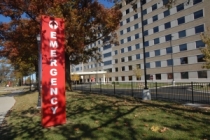If the BBC want journalism by numbers, they should at least get the numbers right
It shouldn’t be possible to write about a subject and leave your readers with less knowledge than they started with, but if it is, the BBC achieved it today with an article on the subject of hospital chaplains. The hook for the article was a Freedom of Information request on the subject by BBC Local Radio, but the original motivation for that request is unclear.
 The article didn’t get off to a good start, catching my attention with a headline claiming that “NHS Chaplaincy services cut by 40%”. The failure to specify that this only related to England could possibly be forgiven, but the headline gave no detail of the timescale for this drop (it was since 2009), and the omitted “of hospitals” is vitally important.
The article didn’t get off to a good start, catching my attention with a headline claiming that “NHS Chaplaincy services cut by 40%”. The failure to specify that this only related to England could possibly be forgiven, but the headline gave no detail of the timescale for this drop (it was since 2009), and the omitted “of hospitals” is vitally important.
As if to emphasise the error, the article goes on to say that 25% of Trusts had increased chaplaincy hours since 2009 (I made it 29% from their provided data), and the actual national reduction in hours was a mere 8.5% (again, my check on their data made it less than 8%, but I also found that 47% of Trusts had reduced chaplaincy hours, not 40%. The dataset was hard to use, though, so user error at either end is a plausible hypothesis).
The misleading headline was eventually corrected shortly before 8.00, nearly six hours after being published, but at 11.00 the BBC’s religion page still carried the headline “Chaplain cuts – Services cut by 40% in English hospitals over the past five years”, a claim which is manifestly untrue and contradicted by their own article.
Having manufactured a story out of very little and hyped it beyond the facts, you’d be forgiven for thinking it couldn’t get any worse. But you’d be wrong. The BBC then proceeded to advance some incredibly poor arguments on the subject, which did no one any favours.
First up was Revd Mark Burley, President of the College of Healthcare Chaplains, who said:
If the hospital provides nothing for a person who has a religious faith then they’re failing that aspect of that person’s holistic care
Why religious belief should be uniquely favoured in this way isn’t specified, but there’s more.
If that person’s illness is providing them with a religious crisis, or if the person is dying and the family is very anxious that someone should come and say prayers in line with that person’s faith, then it is part of the care offered by the hospital to ensure that that happens. One can’t rely on volunteers to come in in the middle of the night to provide those prayers. They need to be members of staff who are trained and equipped and who understand hospitals
Again, there’s no explanation of why the NHS should be paying to help people going through a  religious crisis, why someone needs to “understand hospitals” (whatever that means) to say a prayer, or why someone with religious beliefs couldn’t call their own priest for support if required. It’s an unconvincing mixture of assertion and assumption. It’s possible that his later claim that “the chaplaincy service is a valuable part of the clinical care of the patient” is accurate, for certain values of valuable and clinical, but no evidence is offered to support it.
religious crisis, why someone needs to “understand hospitals” (whatever that means) to say a prayer, or why someone with religious beliefs couldn’t call their own priest for support if required. It’s an unconvincing mixture of assertion and assumption. It’s possible that his later claim that “the chaplaincy service is a valuable part of the clinical care of the patient” is accurate, for certain values of valuable and clinical, but no evidence is offered to support it.
Then, for the human interest angle, we hear from the mother of a boy who died:
“If you have a faith, you do need some guidance there,” she said.
“You can’t find it in your own strength at a point like that in your life, when you’ve just heard this horrible news that your son’s going to die and although they’ve got all this wonderful medical technology there’s really nothing they can do”
While I have a huge amount of sympathy for her position, this is the single worst part of the entire article. It not only continues Revd Mark Burley’s implication that chaplains are exclusively religious (which isn’t the case, and is clarified in a related BBC report), it actually suggests that atheists don’t have any problems, or if faced with a shock or bereavement would simply shrug and walk away. I don’t have words for how I feel about that.
But just as every article has to have the human interest angle, there always has to be a section at the bottom where “the other side” get to put their case. Sure enough, Terry Sanderson speaks up for the National Secular Society, but after virtually reiterating the unspun version of the BBC’s own findings that there’s been little change overall, he’s quoted as complaining about chaplains without offering an alternative, saying “There must be some other way of doing this.”
I’m naturally suspicious of arguments like this. The close cousin of “Isn’t it awful” and “Someone ought to do something about that”, it’s generally the last refuge of malcontents with a long list of gripes but no better answer. From reading this, and Sanderson’s view that religions “must make some other arrangement”, it would be easy to conclude that the NSS were just moaning, reducing their position to “Ugh! Religion!”
Of course, this isn’t true. An NSS member is already leading proposals for chaplains to be charitably funded in Wales, as I’ve mentioned before. But it’s the impression given by this report, which either fails to offer this significant background or worse, excised it from Sanderson’s comments to reduce his input down to an appropriately brief “opposing view”.
 No one should be happy with this report, from the basic factual inaccuracies onwards. The pro side come across as self-interested, concerned more with their own intangible needs than the genuine medical support that could otherwise be bought with the money, and blissfully unaware that people of no faith have emotions and feelings too. The antis were restricted to a very brief response, which made it seem that their opposition was little more than a kneejerk, with no alternative suggestions to offer.
No one should be happy with this report, from the basic factual inaccuracies onwards. The pro side come across as self-interested, concerned more with their own intangible needs than the genuine medical support that could otherwise be bought with the money, and blissfully unaware that people of no faith have emotions and feelings too. The antis were restricted to a very brief response, which made it seem that their opposition was little more than a kneejerk, with no alternative suggestions to offer.
If you knew nothing about the subject, you’d feel as if you’d learnt something by reading this, but you’d probably end up more misinformed than you were before. It’s journalism by numbers – superficial, badly presented and misleading at best. On such a polarised and controversial topic, with many subtleties that can are commonly misunderstood, the BBC must do better than this.
Images courtesy of linder6580, Kurhan and TALUDA, used with permission

I think you missed another angle here:
It could also imply the rather arrogant presumption of “no atheists in foxholes”, that when faced with a crisis we’ll automatically turn to a Jesus-toting individual for a shoulder to cry on. Thereby they can maintain it is a service for everyone.
Sanderson definitely missed a trick though. He could have called for greater investment of the vastly underfunded counselling services. Cruse for example gets a pittance for the vital service it provides and the care is very basic – most people will end up paying for private counselling.
I agree, it could mean that. Given the context, though, I think that’s quite a stretch. There’s a clear distinction made between people with and without faith in these situations, which suggests to me that there must be atheists in those foxholes.
The counselling suggestion is an excellent one, both practically and strategically, but I wouldn’t criticise Sanderson over it. The poor reporting here has the advantage of making me very aware that any comments are fed through a journalist filter. Even a direct quote may be misleading, and we can’t assume anything from comments which aren’t reported. Maybe those comments were made, in some detail, but omitted because of complexity, space restrictions or because they didn’t suit the angle of the report.
I got the idea about counselling from the apologist you had on here. He was very keen to push the idea that the Chaplaincy Service was effectively a counselling service. And I know from personal experience how much mental health is vastly underfunded by the NHS – especially in counselling when even somebody who is depressed has to wait months for NHS therapy.
Also, I cannot imagine that any counselling service the Chaplaincy provides is anywhere near the quality of that provided by a properly trained therapist.
Coming back to another point in the article, I do know from personal experience that patients are able and do summon their parish priests for last rites so again – Chaplaincy seems superfluous. And if it is superfluous either we get rid of it to save money or we ask that the service moves to a voluntary one.
Whichever way you look at it, Chaplains are a waste of money and time.